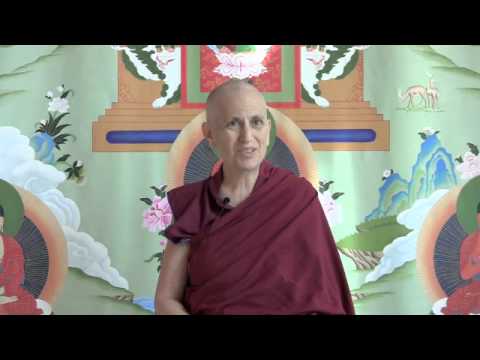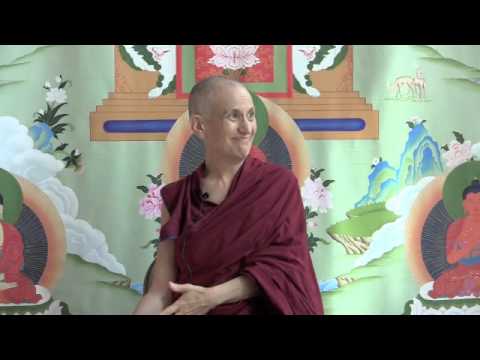Healing broken trust
Part of a series of short Bodhisattva's Breakfast Corner talks on the topic of trust.
- How to recover a trusting relationship in a marriage
- Sincere regret and open honesty are important in trying to repair a relationship
Healing broken trust (download)
Today I received an email from a friend who is married, and his wife is a closer friend of mine, but he is also a friend. It was cc´ed also to his wife, and he was saying that he has not been behaving well in his marriage and has been deceiving his wife, developing quite an emotional attachment to another woman through Facebook, but eventually evolving into meeting for lunch and so on and so forth. He has also been spending a lot of money on gadgets and widgets and computer stuff and not telling his wife about the expenditures. Now the egg cracked open, and she found out, and it’s a mess. His wife has kind of lost trust in him, and he feels a great deal of regret.
During this whole process, he was telling himself that he wasn’t doing anything wrong. That with this other woman—it doesn’t look like they had a sexual relationship, but clearly, there was some energy—that he was just telling himself he was just being a mentor to her, helping her with different projects, giving her advice, that he wasn’t cheating on his wife in any way. Then when she found out, he realized, uh-oh, I was doing just that. He feels enormous regret, and he is now very afraid of losing his wife, that she is just going to wash her hands and say, “Ciao, bye bye, fellow.” So he wrote for help.
The reason I’m telling you this, is we had started before the weekend, I had given a talk about trust, and this story is about one of trust. Here it’s trust in a marital relationship, but also in a community, we have the same kind of trust that binds us together, that we’re all working together for a same goal. If someone in the community, for example, were to start writing lots of emails to some other person outside the community and develop an emotional relationship with that person, then they would start doing some kind of funny things. Eventually the community notices, then the community very much feels the trust is betrayed. Instead of all of us working together, going in the same direction, one person is jumping into a pool of attachment, which is the opposite direction of what we’re all going through, where we’re all going.
It’s similar in that situation, and I think with Facebook and the Internet, it’s so easy for all these things to happen. That’s one of the reasons why we have regulations here in the Abbey about how much email people can do, how often they can be on the Internet, and that nobody here has Facebook accounts, and that we don’t check Facebook, unless it has something to do with the Abbey. It’s to help protect us from our minds going off in this kind of direction, which they so easily do.
The question comes, in a situation like this man’s, which could happen to any of us, then what do we do? Where we’ve behaved in a way that has broken trust, and then when we realize what we’ve done, how do we make amends? The question also arises, on the other part, when somebody has broken trust with us, how do we deal with the situation? How do we decide whether to continue having a close relationship with this person or not? Then how do we heal our own pain in the situation? These are questions that most human beings wrestle with, because I think most of us at one time or another have broken others’ trust, and most of us at one time or another have experienced others breaking our trust. Is that right? I know it’s true for me.
In the situation where we’re the one who’s broken the trust, I think of course, a real sincere feeling of regret is the most important thing, and I was very impressed with this man’s email, because he stated the whole thing out, everything, specific details of what he had done. He didn’t just say, “I started an emotional relationship with somebody but now I see I didn’t want that.” No. He spelled the whole thing out. With the extra spending, he spelled the whole thing out. I really respect that, like I said, the email was sent to me, and it was cc´ed to his wife. He is not concealing.
We can see this relates so much to our vinaya. For example in the class of precepts, the sanghavasesa, if we conceal something, the penalty is greater, and the negative karma is greater. This especially shows in the sanghavasesa class, because for every day you conceal the events, there’s one more day of penance that you undertake. Our mind is so tricky. We do something and then it’s like, well, it wasn’t that big of a deal, so I’ll just conceal it. I won’t do that anymore as long as somebody else doesn’t find out, it’s okay. If they find out, it’s okay, I don’t need to spell the whole thing out.
So I really respected that he just said, “This is what I’ve done, it was awful, it was reprehensible, and I feel a great deal of regret and sorrow about it. I really love my wife, and I’m really afraid of losing her right now.” That kind of honesty is really the first step for healing, I think. He was asking me about Buddhist practices to do, and how Buddhism can help him, because his wife has for a long time been encouraging him to get interested in the Dharma. He has been doing some meditation, but now he really wants to undertake something that will really help him change these kinds of habits and tendencies within himself. I think the regret, the desire to change, and then, as his wife is telling him, actions speak louder than words. She’s not satisfied with the words. She wants to see what he’s actually going to do. In our purification practice, that comes as the remedial behavior. Isn’t it? We have regret, restoring the relationship, making a determination not to do it again, and remedial behavior. This comes also in his situation of restoring his relationship with his wife.
Venerable Thubten Chodron
Venerable Chodron emphasizes the practical application of Buddha’s teachings in our daily lives and is especially skilled at explaining them in ways easily understood and practiced by Westerners. She is well known for her warm, humorous, and lucid teachings. She was ordained as a Buddhist nun in 1977 by Kyabje Ling Rinpoche in Dharamsala, India, and in 1986 she received bhikshuni (full) ordination in Taiwan. Read her full bio.


